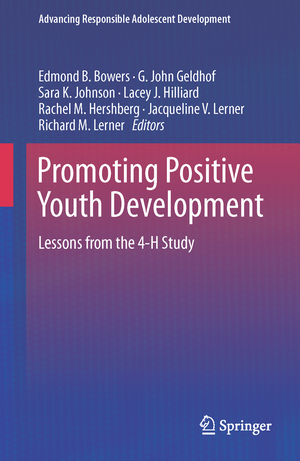Promoting Positive Youth Development: Lessons from the 4-H Study: Advancing Responsible Adolescent Development
Editat de Edmond P. Bowers, G. John Geldhof, Sara K. Johnson, Lacey J. Hilliard, Rachel M. Hershberg, Jacqueline V. Lerner, Richard M. Lerneren Limba Engleză Hardback – 22 iul 2015
- The regulation of emotion in adolescence.
- School engagement, academic achievement, and positive youth development.
- Peer relationships and positive youth development.
- Identity development in adolescence and the implications for youth policy and practice.
- Promoting adolescent sexual health in youth programming.
- A positive youth development approach to bullying.
“This volume is destined to become the handbook for anyone interested in the bourgeoning field of positive youth development. Based on ground breaking, longitudinal research from top researchers in the field, Promoting Healthy Development for America’s Youth presents a rich, theoretically grounded understanding of the landscape today’s youth and programs. The contributors provide
clear,data-driven guidance regarding the types of programs and settings that are most beneficial to young people.” Jean E. Rhodes, Ph.D.
Frank L. Boyden Professor
Department of Psychology
University of Massachusetts, Boston
| Toate formatele și edițiile | Preț | Express |
|---|---|---|
| Paperback (1) | 640.71 lei 6-8 săpt. | |
| Springer International Publishing – 15 oct 2016 | 640.71 lei 6-8 săpt. | |
| Hardback (1) | 646.94 lei 6-8 săpt. | |
| Springer International Publishing – 22 iul 2015 | 646.94 lei 6-8 săpt. |
Din seria Advancing Responsible Adolescent Development
- 20%
 Preț: 567.62 lei
Preț: 567.62 lei - 15%
 Preț: 641.71 lei
Preț: 641.71 lei - 24%
 Preț: 669.06 lei
Preț: 669.06 lei - 15%
 Preț: 645.47 lei
Preț: 645.47 lei -
 Preț: 382.18 lei
Preț: 382.18 lei - 20%
 Preț: 552.44 lei
Preț: 552.44 lei - 5%
 Preț: 1024.80 lei
Preț: 1024.80 lei - 20%
 Preț: 547.90 lei
Preț: 547.90 lei -
 Preț: 389.49 lei
Preț: 389.49 lei - 18%
 Preț: 948.79 lei
Preț: 948.79 lei -
 Preț: 389.11 lei
Preț: 389.11 lei -
 Preț: 384.70 lei
Preț: 384.70 lei - 18%
 Preț: 995.17 lei
Preț: 995.17 lei - 24%
 Preț: 804.56 lei
Preț: 804.56 lei - 15%
 Preț: 701.40 lei
Preț: 701.40 lei -
 Preț: 394.51 lei
Preț: 394.51 lei - 15%
 Preț: 646.30 lei
Preț: 646.30 lei -
 Preț: 391.99 lei
Preț: 391.99 lei - 15%
 Preț: 643.34 lei
Preț: 643.34 lei - 15%
 Preț: 664.29 lei
Preț: 664.29 lei -
 Preț: 395.63 lei
Preț: 395.63 lei -
 Preț: 395.63 lei
Preț: 395.63 lei -
 Preț: 382.75 lei
Preț: 382.75 lei - 18%
 Preț: 733.96 lei
Preț: 733.96 lei
Preț: 646.94 lei
Preț vechi: 761.10 lei
-15% Nou
Puncte Express: 970
Preț estimativ în valută:
123.81€ • 128.92$ • 104.64£
123.81€ • 128.92$ • 104.64£
Carte tipărită la comandă
Livrare economică 07-21 martie
Preluare comenzi: 021 569.72.76
Specificații
ISBN-13: 9783319171654
ISBN-10: 3319171658
Pagini: 400
Ilustrații: XII, 288 p. 2 illus. in color.
Dimensiuni: 155 x 235 x 22 mm
Greutate: 0.6 kg
Ediția:1st ed. 2015
Editura: Springer International Publishing
Colecția Springer
Seria Advancing Responsible Adolescent Development
Locul publicării:Cham, Switzerland
ISBN-10: 3319171658
Pagini: 400
Ilustrații: XII, 288 p. 2 illus. in color.
Dimensiuni: 155 x 235 x 22 mm
Greutate: 0.6 kg
Ediția:1st ed. 2015
Editura: Springer International Publishing
Colecția Springer
Seria Advancing Responsible Adolescent Development
Locul publicării:Cham, Switzerland
Public țintă
ResearchCuprins
1.Applying Research about Adolescence in Real-World Settings: The Sample Case.- Part I The Strengths of Youth: Self-Regulatory Capacities.- 2.Intentional Self Regulation in Youth: Applying Research Findings to Practice and Programs.- 3.The Regulation of Emotion in Adolescence.- 4.School Engagement, Academic Achievement, and Positive Youth Development.- 5.Building Hope for Positive Youth Development: Research, Practice, and Policy.- Part II The Contexts of Youth: Developmental Assets.- 6.Youth-Adult Relationships and Positive Youth Development.- 7.Peer Relationships and Positive Youth Development.- 8.Promoting Healthy Lifestyles through Youth Activity Participation: Lessons from Research.- Part III Positive Youth Development: Indexing Adaptive Developmental Regulations.- 9.The Five Cs Model of Positive Youth Development.- 10.Identity Development in Adolescence: Implications for Youth Policy and Practice.- Part IV Outcomes of PYD: The Impact of Adaptive Developmental Regulations.- 11.Promoting Contribution among Youth: Implications from Positive Youth Development Research for Youth Development Programs.- 12.Promoting Adolescent Sexual Health in Youth Programming: Implications of a Positive Youth Development Perspective.- 13.A Positive Youth Development Approach to Bullying: Promoting Thriving and Reducing Problem Behaviors.- 14.Afterword: On the Contributions of the 4-H Study of Positive Youth Development.
Recenzii
“This book is both timely and relevant, as policy makers and individuals entrusted with the task of developing youth programs struggle with ways in which to promote positive youth development. … Researchers in behavioral sciences … and practitioners in guidance and youth developmental programs will find this book to be an extremely valuable reference guide. I highly recommend it as a necessary tool in the continuing effort to ensure that future youth development programs are grounded in evidence-based research.” (Michael S. Goldsby, Doody's Book Reviews, March, 2016)
“This is a chock-full, scholarly volume that might best be lodged in a research library. Among its greatest assets in addition to some valuable findings is that it includes extensive and valuable reference lists and many useful suggestions for future research, following onthe 4-H Study.” (Sherry Lynn Hatcher, PsycCRITIQUES, Vol. 61 (3), January, 2016)
“This is a chock-full, scholarly volume that might best be lodged in a research library. Among its greatest assets in addition to some valuable findings is that it includes extensive and valuable reference lists and many useful suggestions for future research, following onthe 4-H Study.” (Sherry Lynn Hatcher, PsycCRITIQUES, Vol. 61 (3), January, 2016)
Notă biografică
Edmond P. Bowers is a Research Assistant Professor at Tufts University. He received his doctorate in Applied Developmental and Educational Psychology from Boston College. His research interests include a focus on important non-parental adults and the various ways that these adults can promote positive development in young people. G. John Geldhof is an Assistant Professor at Oregon State University. He received his doctorate in Quantitative and Developmental Psychology from the University of Kansas. His research interests include quantitative methods, positive youth development and models of self-regulation. Sara K. Johnson is a research assistant professor at the Institute for Applied Research in Youth Development at Tufts University. Her work integrates the study of positive youth development, civic engagement and identity development using mixed-methods approaches.
Textul de pe ultima copertă
This book presents the results of a longitudinal 4-H study of youth development. The volume discusses how self-regulation and contextual resources (e.g., strong relationships with parents, peers, and the community) can be fostered in young people to contribute to optimal functioning throughout life. Each chapter examines a particular aspect of youth thriving, and offers findings on the role of positive development in a variety of outcomes. Contributors introduce a contemporary model of positive development for diverse youth, provide examples of effective youth development programs, and suggest applications for informing the next generation of policy and practice.
Among the featured topics:
“This volume is destined to become the handbook for anyone interested in the bourgeoning field of positive youth development. Promoting Positive Youth Development presents a rich, theoretically grounded understanding of the landscape today’s youth, families and programs. The contributors provide clear, data-driven guidance regarding the types of programs and settings that are most beneficial to young people.”
Jean E. Rhodes, Ph.D.
Department of Psychology
University of Massachusetts,
Boston
Among the featured topics:
- The regulation of emotion in adolescence.
- School engagement, academic achievement, and positive youth development.
- Peer relationships and positive youth development.
- Identity development in adolescence and the implications for youth policy and practice.
- Promoting adolescent sexual health in youth programming.
- A positive youth development approach to bullying.
“This volume is destined to become the handbook for anyone interested in the bourgeoning field of positive youth development. Promoting Positive Youth Development presents a rich, theoretically grounded understanding of the landscape today’s youth, families and programs. The contributors provide clear, data-driven guidance regarding the types of programs and settings that are most beneficial to young people.”
Jean E. Rhodes, Ph.D.
Department of Psychology
University of Massachusetts,
Boston
Caracteristici
Synthesizes the longitudinal evidence base on positive youth development (PYD) Provides an overview of relational developmental systems theories Examines leading theories of adolescent development that frame the PYD perspective Describes the Five Cs (competence, confidence, connection, character and caring) model of PYD Recommends policy innovations and programs as derived primarily from the 4-H Study of PYD Includes supplementary material: sn.pub/extras









